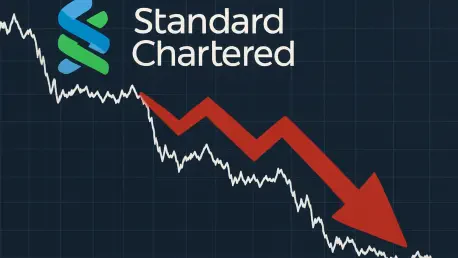What happens when a global banking giant, riding high on record earnings, suddenly finds itself in the crosshairs of political scrutiny? Picture this: a single letter from a U.S. lawmaker sends shockwaves through the financial world, wiping nearly 9% off a bank’s stock value in one day, as happened to Standard Chartered on August 15, 2023, when allegations of sanctions evasion surfaced, shaking investor confidence to its core. This story isn’t just about numbers on a ticker—it’s about the fragile trust that holds markets together and how quickly it can unravel under the weight of geopolitical tension.
The Heart of the Matter
Why does this sudden drop in Standard Chartered’s shares matter to anyone beyond the trading floor? The answer lies in the broader implications of regulatory scrutiny on global finance. Banks like this London-based institution are pillars of economic stability, influencing everything from personal loans to pension funds. When a U.S. lawmaker publicly demands an investigation into potential misconduct, it’s not just a headline—it’s a signal of potential systemic risks that could ripple across borders, affecting millions who rely on financial institutions for security.
This event also underscores a critical tension in today’s world: the clash between political agendas and corporate accountability. With Standard Chartered’s stock having soared to near 12-year highs just days before the plunge, the sharp reversal highlights how external forces can overshadow even the strongest financial performance. For stakeholders, this is a wake-up call to the vulnerabilities lurking beneath market optimism.
Behind the Headlines: A Lawmaker’s Call
The catalyst for this financial tremor was a pointed accusation from Republican Representative Elise Stefanik of New York. On August 15, 2023, she released a letter via the social media platform X and her official website, urging Attorney General Pam Bondi to appoint a special attorney to investigate Standard Chartered for alleged sanctions evasion. Emphasizing urgency, Stefanik pressed for action before a related legal case could expire, thrusting the bank into an unflattering spotlight.
Market reaction was immediate and brutal. Shares of Standard Chartered plummeted 9% at the opening, eventually closing 7.2% lower, as traders directly attributed the slide to the lawmaker’s public statement. This wasn’t a random dip; it was a visceral response to the specter of legal consequences and reputational damage, amplified by the bank’s past run-ins with U.S. authorities over similar issues.
Adding fuel to the fire, Standard Chartered’s history of regulatory challenges provided context for the market’s jitters. Back in 2019, the bank paid a hefty $1.1 billion settlement for breaching sanctions involving Iran and other nations, alongside navigating a long-running civil case since 2012. This backdrop made Stefanik’s allegations feel less like a bolt from the blue and more like a recurring nightmare for investors.
Dueling Narratives in a Public Arena
Amid the chaos, two starkly different stories emerged. On one side, Stefanik framed her call for a probe as a necessary stand for accountability, reflecting the U.S. government’s hardline stance on sanctions compliance. Her letter wasn’t just a request—it was a public challenge, designed to resonate with constituents and policymakers who prioritize strict enforcement of international rules.
On the flip side, Standard Chartered didn’t mince words in its defense. Labeling the allegations as “entirely false,” the bank pointed to repeated rejections of similar claims in U.S. courts, expressing confidence that a dismissal in the ongoing civil case would hold up on appeal. In a formal statement, the institution reiterated its commitment to cooperating with authorities and combating financial crime, a position likely shaped by years of navigating intense scrutiny.
Caught between these opposing views, the market itself spoke through volatility. A seasoned trader noted that the stock’s nosedive was a direct reaction to Stefanik’s letter, underscoring how sensitive investors are to political noise, especially when it hints at legal battles. With no immediate response from the Attorney General’s office, speculation filled the void, leaving room for uncertainty to fester.
The Bigger Picture: Regulatory Shadows over Finance
This incident is more than a standalone drama; it reflects a growing trend of heightened oversight in the banking sector. Global financial institutions are increasingly under the microscope, as governments tighten the screws on issues like sanctions evasion and money laundering. For Standard Chartered, this isn’t unfamiliar territory—past penalties and deferred prosecution agreements have already tested its resilience, yet the stakes feel higher in an era of amplified political rhetoric.
Beyond the specifics of this case, the event raises questions about the balance between regulation and market stability. When a bank’s stock can tank on the mere suggestion of an investigation, it reveals how fragile investor confidence can be. Data from recent years shows that European banks, including Standard Chartered, have enjoyed stock gains tied to strong earnings—yet a single geopolitical spark can erase months of progress in hours.
For everyday observers, this serves as a reminder of the interconnectedness of finance and policy. Decisions made in political corridors thousands of miles away can impact local economies, from interest rates on mortgages to the value of retirement savings. Standard Chartered’s plight is a microcosm of a larger battle, where compliance isn’t just a legal obligation but a survival imperative.
Charting a Path Through Uncertainty
For investors and stakeholders rattled by this upheaval, actionable strategies emerged to weather the storm. Keeping a close eye on developments around the potential probe was critical—any statement from the Attorney General’s office could shift the narrative overnight. Staying informed through reliable financial news and platforms like X became a priority for gauging real-time sentiment.
Diversification also proved to be a key tactic. Those with heavy exposure to Standard Chartered or similar institutions were advised to reassess their portfolios, spreading risk across sectors less prone to regulatory shocks. Historical resilience offered some comfort—the bank had bounced back from past legal challenges, and its recent earnings suggested underlying strength—but balancing this against ongoing uncertainties was essential.
Looking ahead, the incident prompted a broader reflection on preparedness. Engaging with expert analyses and legal insights helped stakeholders anticipate potential outcomes, while lessons from this episode emphasized the need for banks to fortify their compliance frameworks. As the dust settled, the focus shifted toward building trust and stability, ensuring that future political or legal tremors wouldn’t catch the market off guard again.









